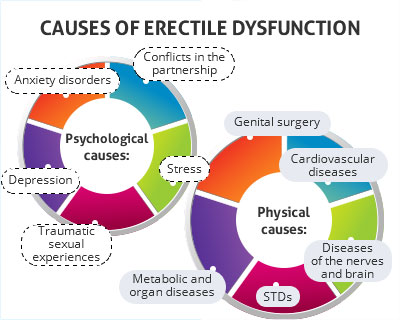What is erectile dysfunction? Erectile dysfunction, also known as erectile dysfunction (ED) or impotence, is a medical term that describes the inability to get or maintain an erection sufficient for sexual intercourse. This condition is one of the most common sexual problems in men. The probability of erectile dysfunction increases with age. The effects can range from minor to severe, depending on the individual case.
What are the symptoms of erectile dysfunction?
Erectile dysfunction consists of several problems linked to a man's sexual performance, including:
- difficulty getting an erection
- difficulty maintaining an erection
- premature ejaculation (ejaculation of semen before or shortly after penetration with minimal sexual stimulation)
- reduced sexual desire
- Peyronie's disease, a curvature of the penis during an erection.
What are the causes of erectile dysfunction?
Erectile dysfunction can be caused by psychological or physical causes. Most men under 40 have mental erectile dysfunction caused by stress, anxiety, guilt, depression, low self-esteem and fear of sexual failure. Although medication can be helpful in this scenario, such erectile dysfunction is best treated with psychotherapy and special techniques. Such techniques can help reduce anxiety associated with sexual intercourse and eliminate anxiety during ED treatment.
In older men, erectile dysfunction usually has a physical cause. Any disease, injury, or medication that damages nerves or decreases blood flow to the penis can cause impotence.
The most common cause of erectile dysfunction is vascular disease. Such conditions as diabetes mellitus, high blood pressure, and the conditions associated with high cholesterol lead to atherosclerosis in penile blood vessels, which in turn restricts blood flow during an erection. Smoking, excessive alcohol consumption, obesity and lack of exercise increase the chance of arteriosclerosis.
The second most common cause of erectile dysfunction is nerve damage. This can be due to chronic diseases (such as diabetes, multiple sclerosis) or to radical pelvic surgeries (such as prostate, bladder or colon removal).
In addition, erectile dysfunction can occur as a side effect of many medications such as antihypertensive drugs, antidepressants, antihistamines, tranquilizers and appetite suppressants.
About 5 percent of all ED cases with physical causes are triggered by hormonal fluctuations.
Which doctor helps with erectile dysfunction?
If you do not have an erection within 3 months or if your erection is weak then you should see a doctor. Most men with erectile dysfunction find it difficult to talk to their doctor about their problems. In this case, it must be understood that many men are affected and therefore your doctor is familiar with the topic of erectile dysfunction.
As mentioned above, the causes of erectile dysfunction are varied. Because of this, multiple doctors may be needed to treat erectile dysfunction. The most important doctor you should see first is the urologist.
You can also consult other doctors, eg psychotherapists, neurologists or psychiatrists, if the cause of your erectile dysfunction is of a psychological nature.
Depending on your health insurance, you may first have to consult your general practitioner before making an appointment with a urologist.
How is erectile dysfunction treated?
Treatment depends on the cause and the severity of the erectile dysfunction. Lifestyle changes, medication adjustments, and psychotherapy/behavior modification should be used in conjunction with standard medical therapy.
Oral medications based on PDE-5 inhibitors (e.g. Viagra, Levitra, Cialis or Spedra) represent the first-line therapies.
For patients who do not respond to oral medications, other treatment options are prescribed, including vacuum pumps, psychotherapy, and testosterone therapy.
- Vacuum Pumps: These can be used to create an erection by using a partial vacuum to draw blood into the penis.
- Psychotherapy: This can be used to reduce the stress and anxiety that can be associated with sex.
- Testosterone therapy: This can improve energy, mood, and sexual interest in older men with low testosterone levels. It is not recommended for men who have normal testosterone levels for their age. This is because there is a risk of prostate enlargement and other side effects.
- Penile implants: These can be surgically placed when other treatments don't work.
Which sexual enhancers help against erectile dysfunction?
Prescription drugs are usually the first treatment option. Here are some of the most common drugs that can increase erectile function:
- Viagra (sildenafil citrate)
- Cialis (tadalafil)
- Levitra (vardenafil)
- Spedra (avanafil)
These ED drugs need to be taken a few minutes to an hour before sexual activity and require sexual stimulation to be effective. They work by increasing blood flow to the penis. None of these PDE-5 inhibitors should be taken more than once a day.
However, the effectiveness of these sexual enhancers depends on the root cause of the ED. Sildenafil and tadalafil work in the same way to dilate blood vessels and increase blood flow to the penis. Unless the cause of ED is a lack of blood flow to the penis, neither medication will help.
Men who take nitrate-based medications such as nitroglycerin pills for heart problems should not use any of these drugs for treatment, as this combination can cause a sudden drop in blood pressure. The most common side effects are headache, back pain, facial flushing and blurred vision.
On our platform you can compare the sexual enhancers mentioned, see the differences and find the cheapest offers in online pharmacies. We help you with the purchase decision.
From the category: Men's Health
Last updated on 24.05.2022







